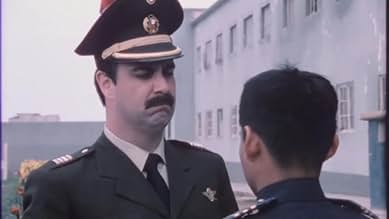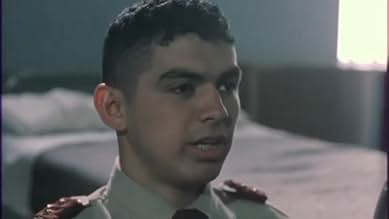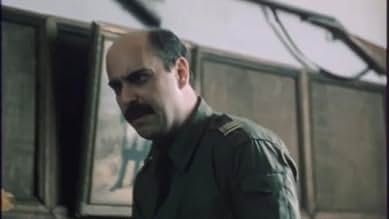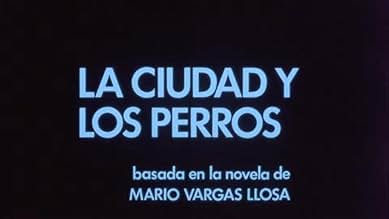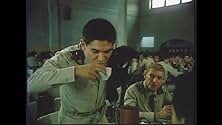NOTE IMDb
7,4/10
783
MA NOTE
Quatre cadets en colère forment un cercle restreint dans le but de battre le système et d'échapper à l'ennui et à l'enfermement étouffant de l'académie militaire, déclenchant une chaîne d'év... Tout lireQuatre cadets en colère forment un cercle restreint dans le but de battre le système et d'échapper à l'ennui et à l'enfermement étouffant de l'académie militaire, déclenchant une chaîne d'événements qui aboutira à un meurtre.Quatre cadets en colère forment un cercle restreint dans le but de battre le système et d'échapper à l'ennui et à l'enfermement étouffant de l'académie militaire, déclenchant une chaîne d'événements qui aboutira à un meurtre.
- Réalisation
- Scénario
- Casting principal
- Récompenses
- 2 victoires au total
Avis à la une
While I agree with many of the comments already made in terms of the low-to-medium quality of this film's production, its incredible story more than makes up for it.
I used this film in a course I taught twice on Masculinity in Latin American Literature -instead of reading the novel the movie adapts, because it allowed me to include more texts in less time. If you can, read the book, but beware: Vargas Llosa's are usually 500+ page novels.
The story ends up being a virtual textbook on male homosocial structures and systems. It spoke loud and clear to all my students on the key issues at play in relationships of power amongst males. All the guys could relate to the pressures of conformity the movie represents. But male and female alike saw the dichotomies and subtleties present in the strange ways in which young men socialize and force each other to fit into orthodox male culture, or else. Though the context is a bit extreme, a military academy is certainly a more restricted and anxiety-producing environment than the average school, it outlines all the roles and behaviors imposed upon young men by the culture at large -a male-oriented and dominated society.
Despite its limitations as a film, the story stands strong and true. Unfortunately, it remains contemporary in many ways. Not one student felt it was irrelevant; instead they found interesting the metaphoric use of "dog" to signify the barbaric qualities of the military/male systems represented. "Dog" is a cultural signifier they hear in popular US music a-plenty and its use in the film added a new dimension to their understanding of its meaning.
Vargas Llosa's semi-autobiographical tale of male isolation and survival is poignant and deep. I recommend it to anyone who is interested in themes related to the life of boys.
I used this film in a course I taught twice on Masculinity in Latin American Literature -instead of reading the novel the movie adapts, because it allowed me to include more texts in less time. If you can, read the book, but beware: Vargas Llosa's are usually 500+ page novels.
The story ends up being a virtual textbook on male homosocial structures and systems. It spoke loud and clear to all my students on the key issues at play in relationships of power amongst males. All the guys could relate to the pressures of conformity the movie represents. But male and female alike saw the dichotomies and subtleties present in the strange ways in which young men socialize and force each other to fit into orthodox male culture, or else. Though the context is a bit extreme, a military academy is certainly a more restricted and anxiety-producing environment than the average school, it outlines all the roles and behaviors imposed upon young men by the culture at large -a male-oriented and dominated society.
Despite its limitations as a film, the story stands strong and true. Unfortunately, it remains contemporary in many ways. Not one student felt it was irrelevant; instead they found interesting the metaphoric use of "dog" to signify the barbaric qualities of the military/male systems represented. "Dog" is a cultural signifier they hear in popular US music a-plenty and its use in the film added a new dimension to their understanding of its meaning.
Vargas Llosa's semi-autobiographical tale of male isolation and survival is poignant and deep. I recommend it to anyone who is interested in themes related to the life of boys.
10dantt777
One of the best Peruvian movies that I have ever watch, and pretty close to the book too. In this movie you can watch one of Peru's best actors in the last 30 years, Gustavo Bueno, who was the doctor in Lima in the Motorcycle Diaries. His motto to the cadets, "what are you laughing at? do you want a naked picture of me? is a classic. You can also see a lot of the racial, ethnic and class issues affecting Peru in those years, the large Indian immigration to Lima, and other cultural characteristics of the region and the country. Leoncio Prado is a real school in Peru. To a ceertain extent, things have not change much in Peru since then, so it is a ninteresting interpretation of the country's soul.
"La Ciudad Y Los Perros" (translated "The City and the Dogs") is one of those cheap Peruvian productions that ends up looking more like a teen exploit film than anything else. A group of teenage boys are at a shady military establishment where some youngsters rule while others are treated as second-rate citizens (that is putting it mildly). When a death occurs, layers and layers of wrong-doing are uncovered and it appears that many of the officers are just as heartless and cold as some of their students. A film that could have sent a real message is damaged by over-acting, poor cinematography, a near invisible musical score and low production values that make the whole thing go into a tail-spin. Honored by many groups in the mid-1980s, but nothing special in the end---not even for the Peruvian cinema. 2.5 out of 5 stars.
I liked the movie but if you read the Mario Vargas Llosa's novel it's even better. The movie is as good as La boca del lobo. The acting is good: Alberto, el Esclavo, Jaguar, and specially Gustavo Bueno as Teniente Gamboa. A classic of peruvian filmography.
The film may have a low budget, a non-existent soundtrack and mediocre acting. Yet the story is so powerful -the movie is loyal to Vargas Llosa's classic novel-, so close to the truth and so well told, it is capable to kick you in the groin.
Le saviez-vous
- AnecdotesThe film was shot in a nearby een jail, the building were very alike.
- GaffesWhen Cadet Alberto Fernández ("The Poet") is giving evidence to the Colonel, a boom mic is visible twice.
- Citations
Lt. Gamboa: Why are you staring at me cadet? You want my picture on my bare ass or what?
- ConnexionsReferences Scum (1979)
Meilleurs choix
Connectez-vous pour évaluer et suivre la liste de favoris afin de recevoir des recommandations personnalisées
Détails
Box-office
- Budget
- 225 000 $US (estimé)
Contribuer à cette page
Suggérer une modification ou ajouter du contenu manquant

